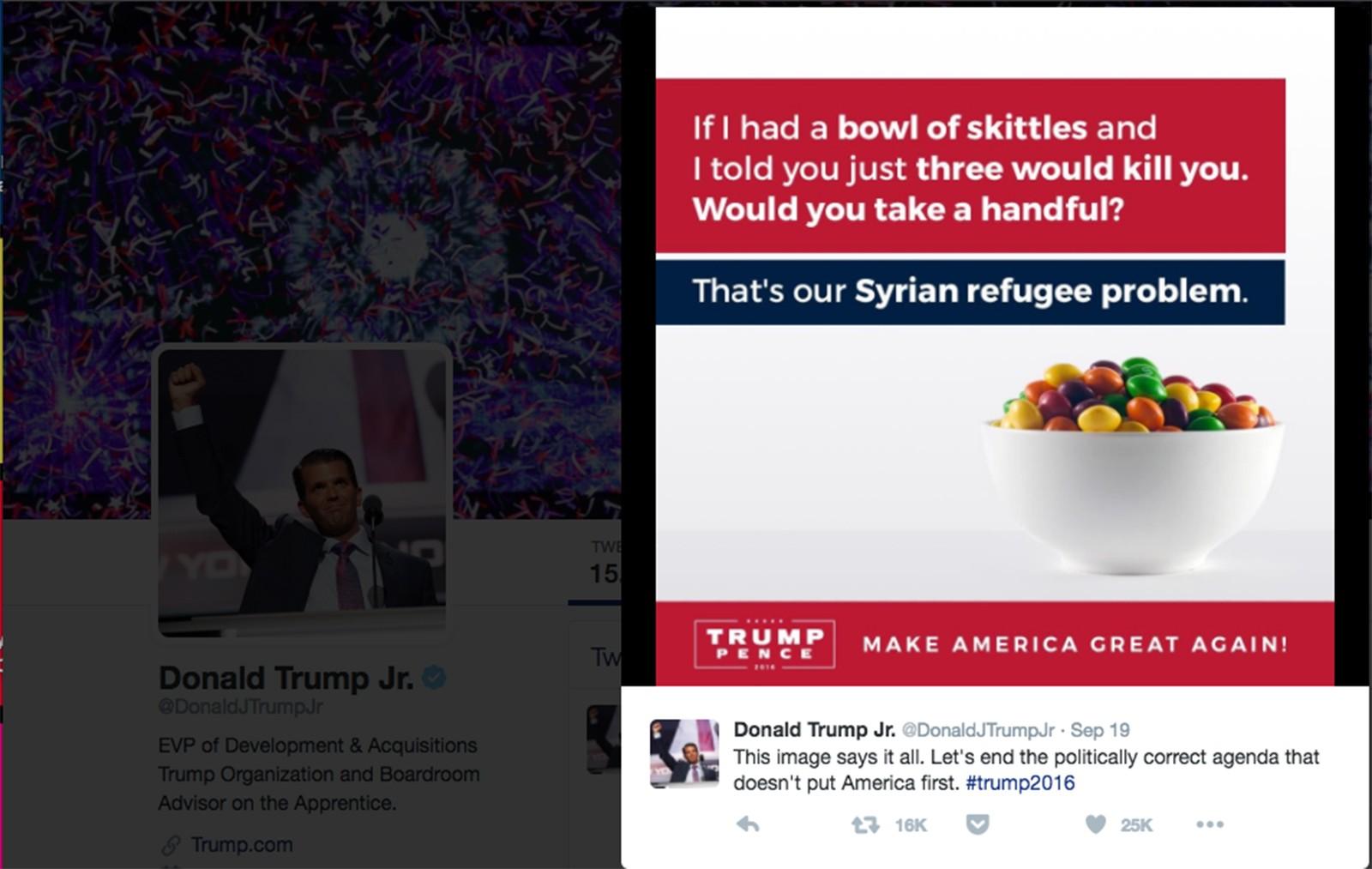Day in and day out, we have our routines. Our schedule is organized and then completed, to be repeated the next day. We fall into our patterns, and exist in a sort of bubble. It takes certain events to pull us from this haven and remind us that there are things beyond Boston University’s campus that are of great importance.
One event to jerk us from our complacency came in the form of a Monday afternoon tweet from Donald Trump Jr.
https://twitter.com/DonaldJTrumpJr/status/778016283342307328
Trump attached an image of a bowl of Skittles to his tweet, with text on the image reading, “If I had a bowl of skittles [sic] and I told you just three would kill you. Would you take a handful? That’s our Syrian refugee problem.” Trump’s accompanying tweet read, “This image says it all. Let’s end the politically correct agenda that doesn’t put America first. #trump2016.”
The tweet itself is nothing short of appalling in a world where children and mothers are denied basic healthcare after literally crossing oceans. Putting aside our political agenda for just a moment, the meme itself is unbelievably offensive. It compares humans fleeing war zones to pieces of candy found in bowls in office buildings across America. The analogy is inappropriate in every way.
The political statement further complicates the usage of the meme. The photographer for the original stock image actually came forward to profess his stance on the refugee crisis, pointing to his own previous refugee status. David Kittos fled from the Turkish occupation of Cyprus, according to a BBC article, and claims he never sold the photo rights to the Trump campaign or anyone, in fact.
As students in the United States, we have a different relationship with the refugee crisis than students in Europe. As documented by The Daily Free Press, BU students briefly got a closer look at life as a refugee, but only when abroad. Because the United States has not historically accepted large numbers of refugees, Syrian and others, we are insulated from this messy issue.
It should not take images of Skittles, a “Daily Show” segment or even an image of a dead child washed ashore on the beaches of Turkey to begin conversations about uncomfortable policy issues. Despite the “BU bubble,” these conversations are necessary to be productive and contributing members of a high-functioning society.
The Commonwealth’s opioid crisis is another example of our blissful ignorance. Occurring on our doorsteps in neighborhoods like East Boston and Cambridge, it is not something often discussed or even acknowledged. Hopefully most students have never experienced addiction at any point, and if they haven’t, it wouldn’t hurt to read an article or two. These are things that are plaguing people in close proximity to us, yet we opt to push them to the shadows while we stay on Comm Ave.
Perhaps we’re just too stressed, and it’s easier to click on videos of elephants or Kardashian garbage than news reels and articles; perhaps we turn to clickbait as a release from our hectic, over-scheduled lives. Or perhaps we’re just too lazy to read that hard-hitting Washington Post piece on the conflicts abroad.
If we don’t know about a particular subject, the least we should do is try to inform ourselves to the best of our abilities. Events like Skittlesgate should remind us of this, and provide a sort of warning.
Reaching back to the days of Ellis Island, America has prided itself on being the “melting pot” of the world. However, it seems to be melting very slowly. Our cultural views are solidified, until events like this cause us to pause and think.
There is a stark difference between expecting omnisciency of all American citizens and expecting an open-minded perspective. The worst thing that can be done when faced with issues outside of comfort zone is to shut down and respond ignorantly, such as Trump Jr. has done.






















































































































